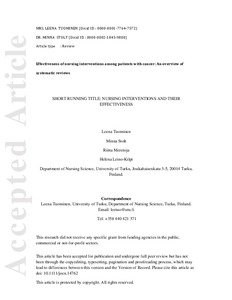Effectiveness of nursing interventions among patients with cancer: An overview of systematic reviews
Tuominen L; Stolt M; Meretoja R; Leino-Kilpi H
https://urn.fi/URN:NBN:fi-fe2021042720514
Tiivistelmä
Aims and objectives To explore nursing interventions used among patients with cancer and summarise the results of their effectiveness. The ultimate goal was to improve the quality of care and provide best evidence for clinicians to refer to while developing effective nursing interventions.
Background Nursing interventions refer to actions that nurses take with the aim of improving the well-being of people with cancer-related health and care needs. A plethora of systematic reviews has been conducted in this research area, although with scattered results. We conducted a comprehensive review to identify and summarise the existing evidence.
Methods This overview of systematic reviews adheres to the PRISMA guidelines. The PubMed, CINAHL, MEDLINE and Scopus databases were searched. Nine reviews reporting findings from 112 original studies published 2007?2017 met the selection criteria. The results of intervention effectiveness were analysed using descriptive quantification and a narrative summary of the quantitative data.
Results The effectiveness of educational nursing interventions was inconsistent on quality of life, attitudes, anxiety and distress, but positive on level of knowledge, symptom severity, sleep and uncertainty. Psychosocial nursing interventions had a significant effect on spiritual well-being, meaning of life, fatigue and sleep. Psychological nursing interventions reduced cancer-related fatigue. Nursing interventions supporting patients? coping had a significant impact on anxiety, distress, fatigue, sleep, dyspnoea and functional ability. Activity-based interventions may prevent cancer-related fatigue.
Conclusions Nursing interventions achieved significant physical and psychological effects on the lives of patients with cancer. Multidimensional nature of interventions by combining different elements reinforces the effect. Priorities for future research include identifying the most beneficial components of these interventions. Relevance to Clinical Practice Implementation of these nursing interventions into clinical practice is important to improve patients? knowledge and quality of life (QoL) as well as reducing various symptoms and side effects related to cancer and its treatment. This article is protected by copyright. All rights reserved.
Kokoelmat
- Rinnakkaistallenteet [29335]
